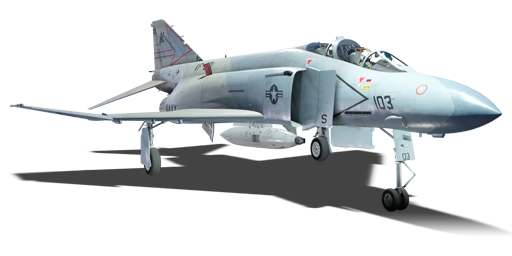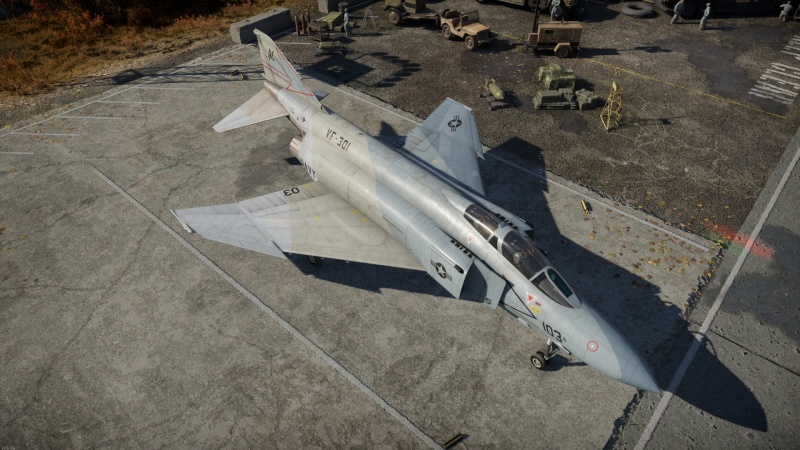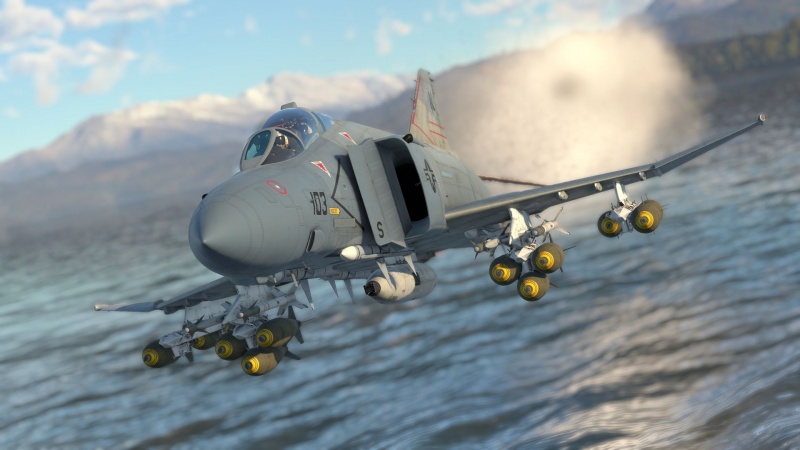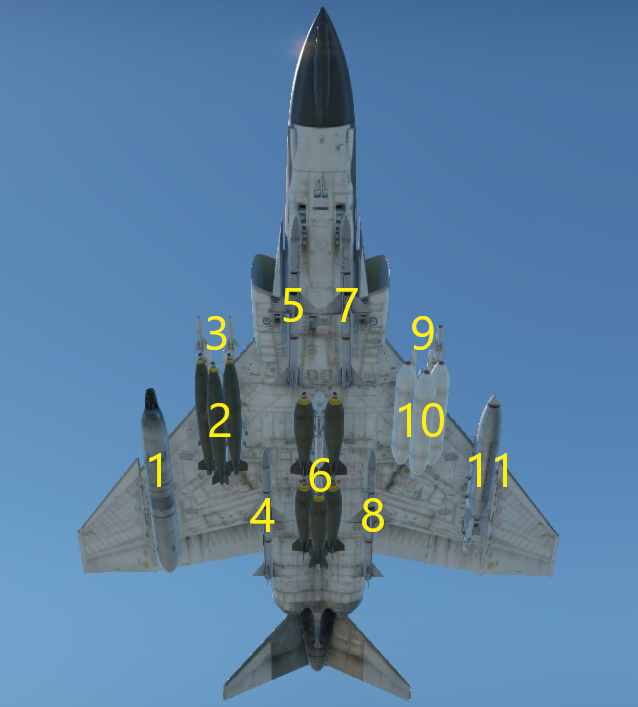Difference between revisions of "F-4S Phantom II"
(Tag: Visual edit) |
Colok76286 (talk | contribs) (Edits) |
||
| Line 202: | Line 202: | ||
Being a slightly upgraded F-4J, the F-4S retains many of its predecessor's defining characteristics. | Being a slightly upgraded F-4J, the F-4S retains many of its predecessor's defining characteristics. | ||
| − | The main difference between the two is the F-4S' leading edge wing slats. These greatly increase | + | The main difference between the two is the F-4S' leading edge wing slats. These greatly increase manoeuvrability, but as a side affect decrease energy retention. Even with improved manoeuvrability, the F-4S still does not pull hard enough to competitively dogfight. |
The most powerful aspect of the F-4S is its weaponry. For IR-guided missiles, it carries AIM-9Hs. Even though they have mediocre performance (max overload 18G), their respectable range and long guidance time makes them ideal for picking off inattentive players or AI planes. The crowning glory of the F-4S' arsenal is the AIM-7F. | The most powerful aspect of the F-4S is its weaponry. For IR-guided missiles, it carries AIM-9Hs. Even though they have mediocre performance (max overload 18G), their respectable range and long guidance time makes them ideal for picking off inattentive players or AI planes. The crowning glory of the F-4S' arsenal is the AIM-7F. | ||
Revision as of 19:39, 2 June 2023
| This page is about the premium American jet fighter F-4S Phantom II. For other versions, see F-4 Phantom II (Family). |
Contents
Description
The F-4S Phantom II is a premium gift rank VII American jet fighter with a battle rating of 11.7 (AB) and 12.0 (RB/SB). It was introduced in Update "Sky Guardians".
General info
Flight performance
| Characteristics | Max speed (km/h at 12,192 m) |
Max altitude (metres) |
Turn time (seconds) |
Rate of climb (metres/second) |
Take-off run (metres) | |||
|---|---|---|---|---|---|---|---|---|
| AB | RB | AB | RB | AB | RB | |||
| Stock | 2,080 | 2,058 | 16000 | 26.5 | 27.4 | 155.0 | 145.2 | 850 |
| Upgraded | 2,224 | 2,140 | 25.5 | 26.0 | 217.6 | 185.0 | ||
Details
| Features | |||||
|---|---|---|---|---|---|
| Combat flaps | Take-off flaps | Landing flaps | Air brakes | Arrestor gear | Drogue chute |
| ✓ | ✓ | ✓ | ✓ | ✓ | ✓ |
| Limits | ||||||
|---|---|---|---|---|---|---|
| Wings (km/h) | Gear (km/h) | Flaps (km/h) | Max Static G | |||
| Combat | Take-off | Landing | + | - | ||
| 1458 | 463 | 1,458 | 618 | 463 | ~11 | ~4 |
| Optimal velocities (km/h) | |||
|---|---|---|---|
| Ailerons | Rudder | Elevators | Radiator |
| < 810 | < 750 | < 700 | - |
Engine performance
| Engine | Aircraft mass | |||||
|---|---|---|---|---|---|---|
| Engine name | Number | Basic mass | Wing loading (full fuel) | |||
| General Electric J79-GE-10 | 2 | 14,205 kg | 408 kg/m2 | |||
| Engine characteristics | Mass with fuel (no weapons load) | Max Gross Weight | ||||
| Weight (each) | Type | 9m fuel | 20m fuel | 30m fuel | ||
| 1,750 kg | Afterburning axial-flow turbojet | 15,964 kg | 18,047 kg | 20,070 kg | 27,058 kg | |
| Maximum engine thrust @ 0 m (RB/SB) | Thrust to weight ratio @ 0 m (WEP) | |||||
| Condition | 100% | WEP | 9m fuel | 20m fuel | 30m fuel | MGW |
| Stationary | 5,250 kgf | 8,159 kgf | 1.02 | 0.90 | 0.81 | 0.60 |
| Optimal | 5,311 kgf (1,458 km/h) |
10,361 kgf (1,400 km/h) |
1.30 | 1.15 | 1.03 | 0.77 |
Survivability and armour
Examine the survivability of the aircraft. Note how vulnerable the structure is and how secure the pilot is, whether the fuel tanks are armoured, etc. Describe the armour, if there is any, and also mention the vulnerability of other critical aircraft systems.
Modifications and economy
Armaments
| Ballistic Computer | |||
|---|---|---|---|
| CCIP (Guns) | CCIP (Rockets) | CCIP (Bombs) | CCRP (Bombs) |
| |
|
|
|
Offensive armament
The F-4S Phantom II is armed with:
- A choice between two presets:
- Without offensive armament
- 60 x countermeasures
Suspended armament
The F-4S Phantom II can be outfitted with the following ordnance presets:
- 1 x 20 mm Mk 11 mod 5 cannon (750 rpg)
- 4 x AIM-9H Sidewinder missiles
- 6 x AIM-7F Sparrow missiles
- 1 x 20 mm Mk 11 mod 5 cannon + 4 x AIM-7F Sparrow missiles + 4 x AIM-9H Sidewinder missiles + 48 x Zuni Mk32 Mod 0 ATAP rockets
- 1 x 20 mm Mk 11 mod 5 cannon + 4 x AIM-7F Sparrow missiles + 4 x AIM-9H Sidewinder missiles + 190 x FFAR Mighty Mouse rockets
- 1 x 20 mm Mk 11 mod 5 cannon + 4 x AIM-7F Sparrow missiles + 4 x AIM-9H Sidewinder missiles + 18 x 250 lb LDGP Mk 81 bombs (4,500 lb total)
- 1 x 20 mm Mk 11 mod 5 cannon + 4 x AIM-7F Sparrow missiles + 4 x AIM-9H Sidewinder missiles + 18 x 500 lb LDGP Mk 82 bombs (9,000 lb total)
- 1 x 20 mm Mk 11 mod 5 cannon + 4 x AIM-7F Sparrow missiles + 4 x AIM-9H Sidewinder missiles + 12 x 750 lb M117 cone 45 bombs (9,000 lb total)
- 1 x 20 mm Mk 11 mod 5 cannon + 4 x AIM-7F Sparrow missiles + 4 x AIM-9H Sidewinder missiles + 8 x 1,000 lb LDGP Mk 83 bombs (8,000 lb total)
- 3x 1,000 lb Mk 79 Mod 1 incendiary bombs (3,000 lb total)
Custom loadout options
| 1 | 2 | 3 | 4 | 5 | 6 | 7 | 8 | 9 | 10 | 11 | ||
|---|---|---|---|---|---|---|---|---|---|---|---|---|
| 20 mm Mk 11 mod 5 cannons (750 rpg) | 1 | |||||||||||
| 250 lb LDGP Mk 81 bombs | 6 | 3 | 6 | 3 | 6 | |||||||
| 500 lb LDGP Mk 82 bombs | 6 | 3 | 6 | 3 | 6 | |||||||
| 750 lb M117 cone 45 bombs | 3 | 3 | 3 | 3 | 3 | |||||||
| 1,000 lb LDGP Mk 83 bombs | 2 | 2 | 3 | 2 | 2 | |||||||
| Mk 79 Mod 1 incendiary bombs | 1 | 1 | 1 | |||||||||
| FFAR Mighty Mouse rockets | 38 | 57 | 57 | 57 | 38 | |||||||
| Zuni Mk32 Mod 0 ATAP rockets | 12 | 12 | 12 | 12 | 12 | |||||||
| AIM-7F Sparrow missiles | 1* | 1 | 1 | 1 | 1 | 1* | ||||||
| AIM-9H Sidewinder missiles | 2* | 2* | ||||||||||
| Maximum permissible loadout weight: 7,257 kg Maximum permissible wing load: 3,000 kg Maximum permissible weight imbalance: 1,500 kg | ||||||||||||
| * Sparrows on hardpoints 2/10 cannot be carried in conjunction with Sidewinders on hardpoints 3/9 respectively | ||||||||||||
Usage in battles
Being a slightly upgraded F-4J, the F-4S retains many of its predecessor's defining characteristics.
The main difference between the two is the F-4S' leading edge wing slats. These greatly increase manoeuvrability, but as a side affect decrease energy retention. Even with improved manoeuvrability, the F-4S still does not pull hard enough to competitively dogfight.
The most powerful aspect of the F-4S is its weaponry. For IR-guided missiles, it carries AIM-9Hs. Even though they have mediocre performance (max overload 18G), their respectable range and long guidance time makes them ideal for picking off inattentive players or AI planes. The crowning glory of the F-4S' arsenal is the AIM-7F.
Pros and cons
Pros:
- Powerful pulse-Doppler radar
- Can carry 8 air-to-air missiles
- One of the best SARH missiles at 11.3
- Can take off and land on aircraft carrier
- A wide range of suspended armaments, suitable for any playstyle
- Can carry enough bombs to destroy a base without significantly affecting its flight performance
Cons:
- Doesn't have an internal gun
- The external gun pod negatively affects flight performance
- Quite large and heavy compared to other fighters at its rank
History
The F-4S is a variant of the F-4 Phantom II, a twin-engine, all-weather jet fighter-bomber originally developed by McDonnell Douglas (now part of Boeing) for the United States Navy in the 1950s. The F-4S was the final production version of the F-4, and saw extensive service during the Cold War and in various conflicts around the world.
The F-4S was developed in response to the need for an advanced fighter-bomber that could operate in all weather conditions and perform a wide range of missions, including air-to-air combat, ground attack, and reconnaissance. It featured improved avionics, a more powerful engine, and upgraded weapons systems compared to earlier variants of the F-4.
One of the F-4S's most significant upgrades was its advanced radar system, which could track multiple targets at once and provide the pilot with a clear picture of the battlefield. It was also equipped with a more sophisticated weapons delivery system, which allowed it to carry a wider variety of bombs and missiles, including the AIM-7 Sparrow and AIM-9 Sidewinder air-to-air missiles, as well as the AGM-65 Maverick air-to-ground missile.
The F-4S saw extensive service with the US Navy and Marine Corps, as well as with several foreign militaries, including the Israeli Air Force and the Japanese Self-Defense Forces. It was used in a variety of conflicts, including the Vietnam War, the Gulf War, and the Gulf of Sidra incident.
Despite its success in combat, the F-4S was eventually phased out of service in the late 1980s and early 1990s, as newer and more advanced fighter aircraft were introduced into the US military fleet. Today, several examples of the F-4S can be found on display in aviation museums and military bases around the world, serving as a reminder of the aircraft's important role in military history.
Media
- Skins
- Videos
See also
- Related development
External links
| McDonnell Aircraft Corporation | |
|---|---|
| Jet Fighters | F2H-2 · F3H-2 |
| F-4C Phantom II · F-4E Phantom II · F-4J Phantom II · F-4S Phantom II | |
| F-15A · F-15C MSIP II · F-15E | |
| Strike Aircraft | AV-8B Plus · AV-8B (NA) |
| Helicopters | AH-6M |
| Export/Licensed | |
| Aircraft | ◄F-4F Early · ◄F-4F · ◄F-4F KWS LV · Phantom FG.1 · Phantom FGR.2 · F-4J(UK) Phantom II · F-4EJ Phantom II · F-4EJ ADTW · Kurnass · Kurnass 2000 |
| F-15J · F-15J(M) · Baz · Baz Meshupar · F-15I Ra’am | |
| ▄AV-8B Plus | |
| Helicopters | Lahatut |
| The McDonnell Aircraft Corporation merged with Douglas Aircraft Company in 1967 to form McDonnell Douglas Corporation. Later it was merged with The Boeing Company in 1997. | |
| See Also | Mitsubishi Heavy Industries |
| USA jet aircraft | |
|---|---|
| Fighters | |
| F9F | F9F-2 · F9F-5 · F9F-8 |
| F-80 | F-80A-5 · F-80C-10 |
| F-84 | F-84B-26 · F-84F · F-84G-21-RE |
| F-86 | F-86A-5 · F-86F-25 · F-86F-2 · F-86F-35 |
| F-89 | F-89B · F-89D |
| F-100 | F-100D |
| F-104 | F-104A · F-104C |
| F-4 | F-4C Phantom II · F-4E Phantom II · F-4J Phantom II · F-4S Phantom II |
| F-5 | F-5A · F-5C · F-5E · F-20A |
| F-8 | F8U-2 · F-8E |
| F-14 | F-14A Early · ▄F-14A IRIAF · F-14B |
| F-15 | F-15A · F-15C MSIP II · F-15E |
| F-16 | F-16A · F-16A ADF · F-16C |
| Other | P-59A · F2H-2 · F3D-1 · F3H-2 · F4D-1 · F11F-1 |
| Strike Aircraft | |
| FJ-4 | FJ-4B · FJ-4B VMF-232 |
| A-4 | A-4B · A-4E Early |
| A-7 | A-7D · A-7E · A-7K |
| AV-8 | AV-8A · AV-8C · AV-8B Plus · AV-8B (NA) |
| A-10 | A-10A · A-10A Late · A-10C |
| F-111 | F-111A · F-111F |
| Other | A-6E TRAM · F-105D · F-117 |
| Bombers | |
| B-57 | B-57A · B-57B |
| USA premium aircraft | |
|---|---|
| Fighters | Thach's F2A-1 · Galer's F3F-2 · F2G-1 · F4U-4B VMF-214 · P-26A-34 · Rasmussen's P-36A · P-40C · P-43A-1 |
| P-47M-1-RE · ⋠P-47M-1-RE · P-51A · P-51D-10 · P-51D-20-NA · ␠Kingcobra · XP-55 | |
| ▃A6M2 · ▃Ki-43-II · ▃Ki-61-Ib · ▃Bf 109 F-4 · ▃Fw 190 A-8 · ▃Spitfire LF Mk IXc | |
| Twin-engine fighters | XP-38G · Bong's P-38J-15 · P-38K · YP-38 · P-61A-11 · XF5F · XP-50 · F7F-3 |
| Jet fighters | P-59A · F-86F-35 · F-89B · F-89D · F-4S Phantom II · F-5C · F-20A |
| Strike aircraft | A-1H · A2D-1 · AU-1 · XA-38 · AV-8A · AV-8B (NA) · A-6E TRAM · A-10A |
| Bombers | A-26C-45DT · B-10B · BTD-1 · PBM-3 "Mariner" · PBM-5A "Mariner" · PV-2D |







